In late 2020, a panel of experts joined MBS students for an event that would give us a new perspective on emerging careers. It was called the Sustainability Landscape Across Industries, and panelists examined the explosive growth of employment opportunities in sustainability that they had seen in industries ranging from pharmaceuticals and personal care products to food science to energy production.
We are learning that those opportunities aren’t limited to jobs specifically for sustainability programs. Indeed, sustainability-related skills are being incorporated more frequently across all kinds of jobs in business and science—and MBS's Sustainability program curricula has been enriched and expanded accordingly to meet these demands, shaped by expert input and real-time workforce data.
The growth of demand for these skills is apparent in Burning Glass’ database of job postings over the past two years. From June 2019 through May 2021, 6,528 unique job postings had “sustainability” in the title, and 108,509 jobs included a request for skills in sustainability, sustainable technologies, or sustainable management. For the period from June 2019 to May 2020, there were 2,575 postings for sustainability-titled jobs. From June 2020 through May 2021, the number increases to 3,953. This is a 54% increase, year over year.
Looking month-by-month, the following chart shows the rapid growth of sustainability-titled jobs over the past two years.
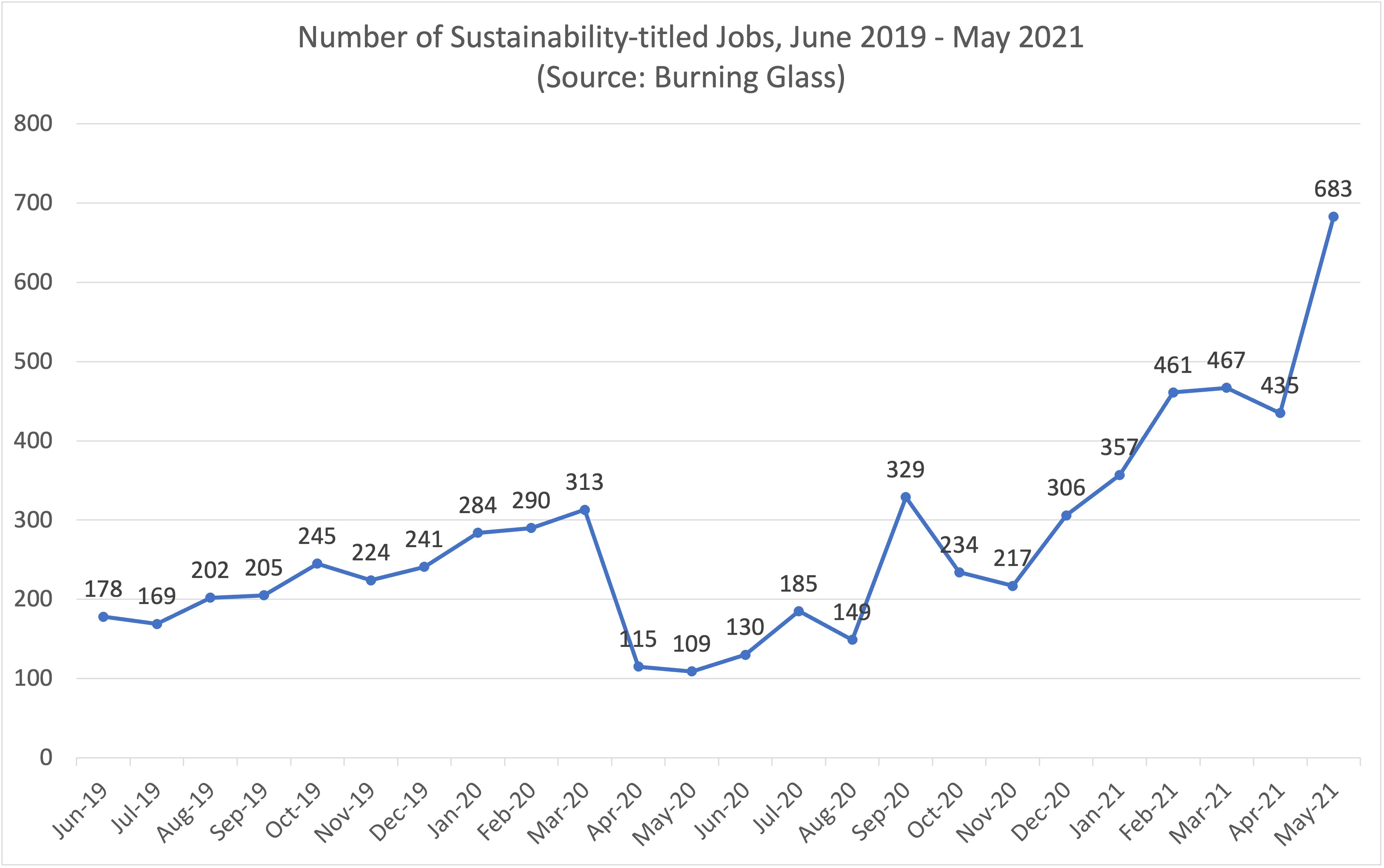
Emsi’s data provides more granular data on job titles. The chart below shows the top 10 jobs with sustainability in the title comparing June 2019 to May 2021. Note the explosive growth in the title Sustainability Manager. Sustainability Consultant did not make the top 10 in June 2019 (it was 13th) but was seventh in May 2021. Meanwhile, the title Sustainability Program Coordinator fell out of the top 10 by May 2021.
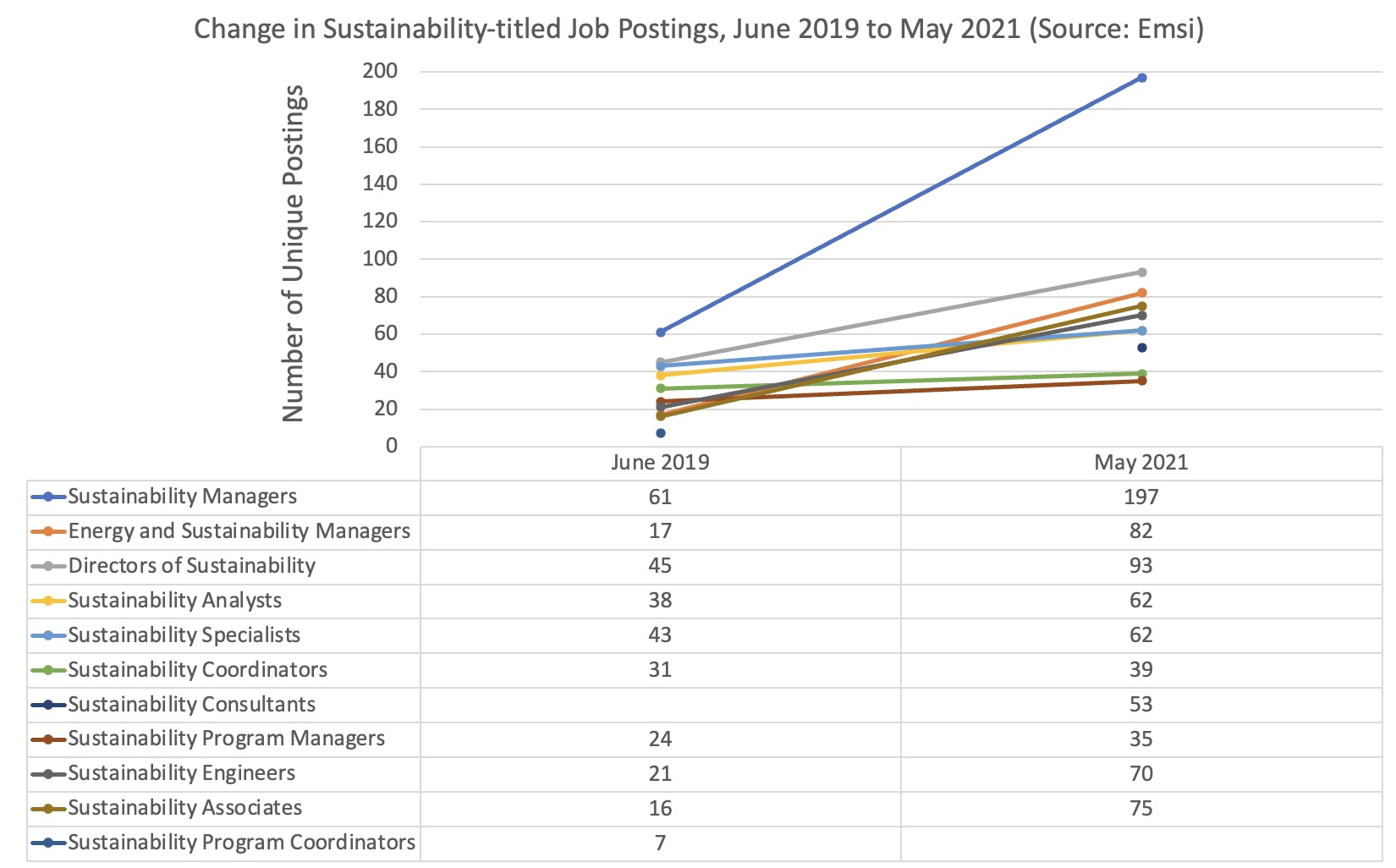
What does that mean in terms of the skills required for such jobs? The chart below shows the top 20 specialized skills in these jobs. In addition to Project Management, the top skills include Environmental Science, Climate Change, Environmental Sustainability, Energy Efficiency, and Greenhouse Gas. (Technically, many of these are not “skills” as much as they are “knowledge,” but Burning Glass combines all such terms in a search.)
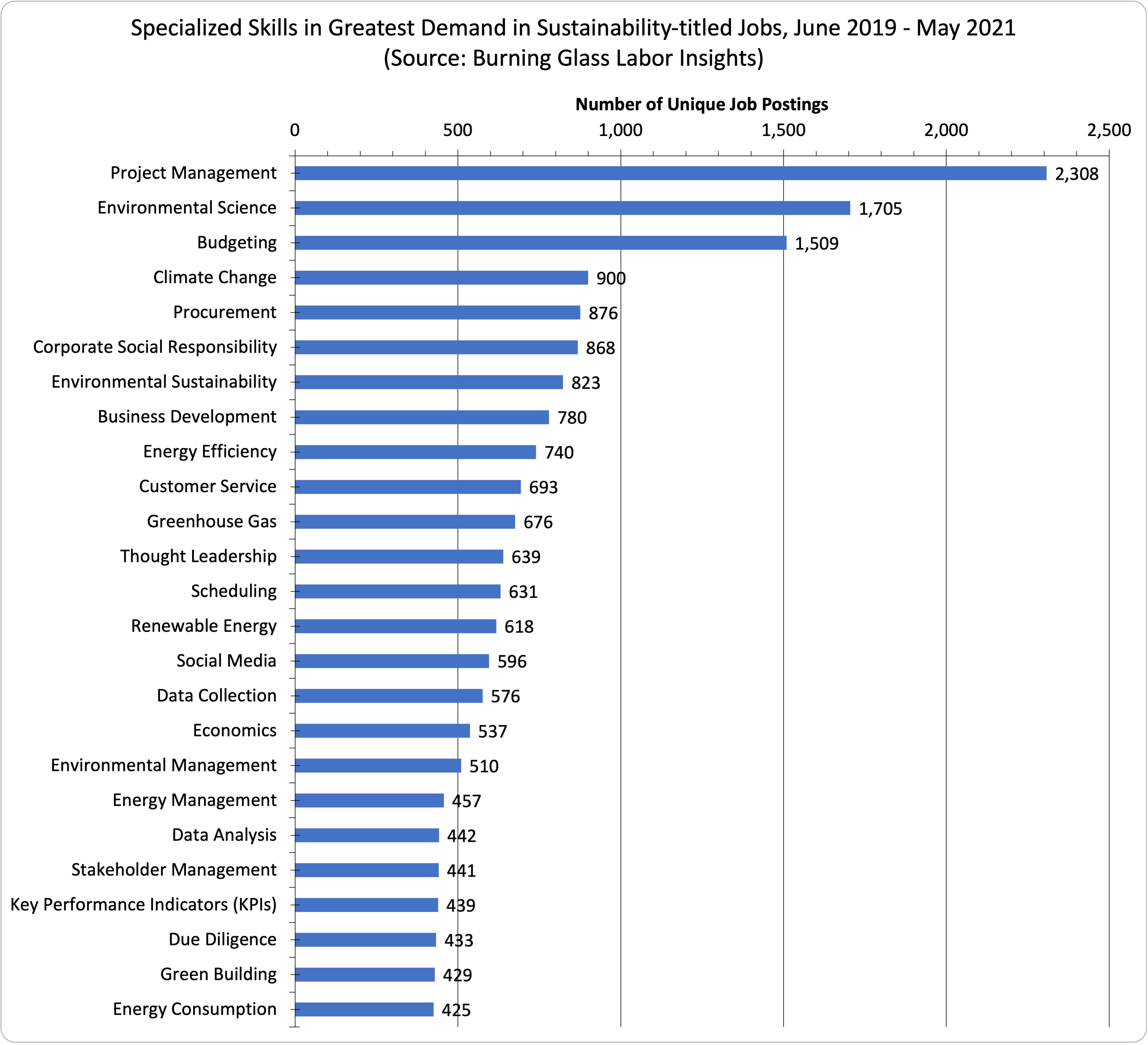
The next chart shows the top professional skills (a.k.a., soft skills or 21st Century skills) in demand in these jobs. MBS students are already focusing on many of these in their coursework and professional development: communication, collaboration, problem-solving, research, and so on.
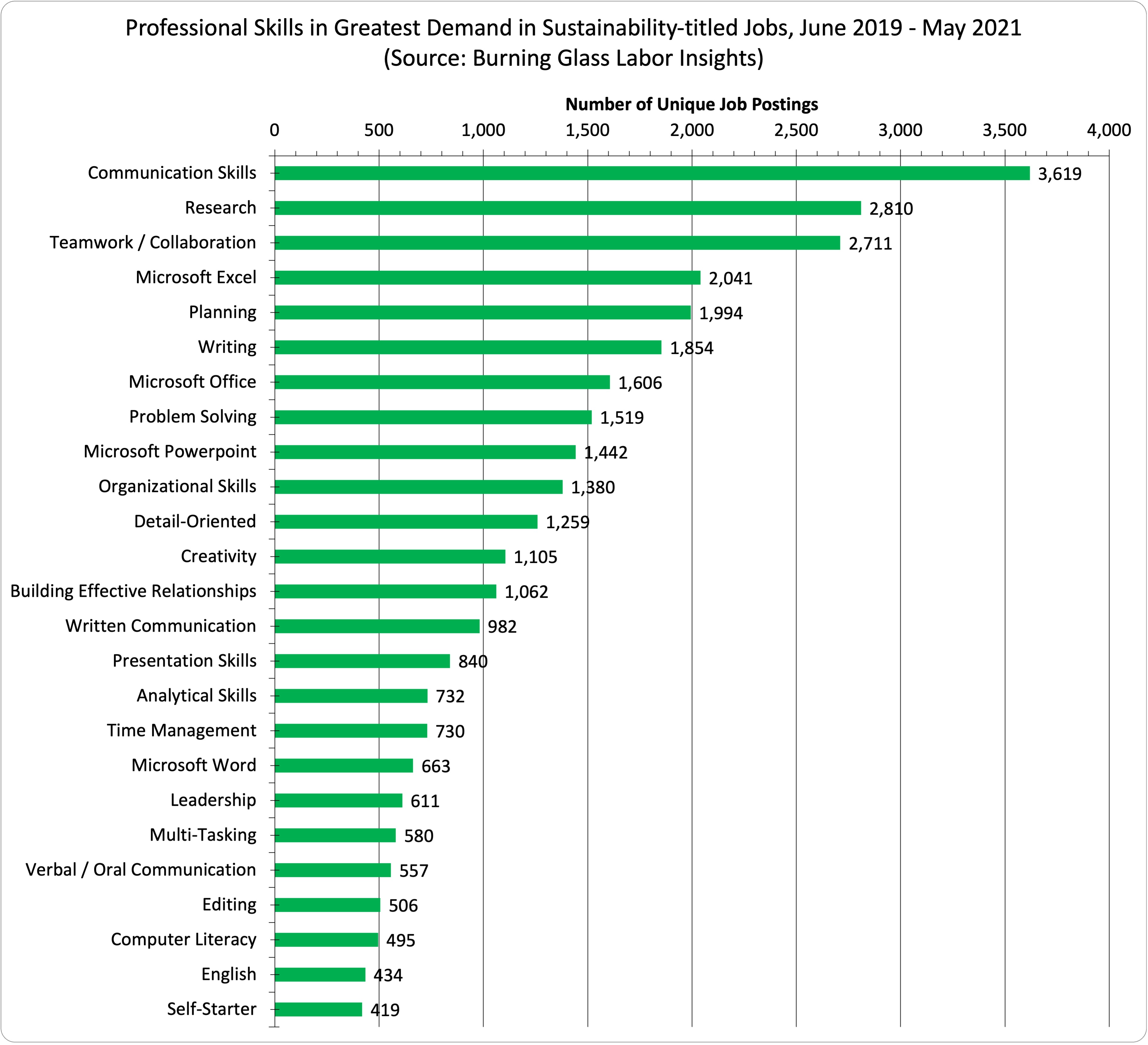
Emsi’s analysis plots the skills that are in demand by employers (black bars on the left in the chart below) against the skills in supply from job candidates’ résumés (blue bars on the right) posted on sites such as Indeed and LinkedIn. Anywhere that demand is significantly higher than supply represents an opportunity for job seekers to highlight such skills when submitting applications. In the specialized skills shown in the chart below, this includes skills such as corporate sustainability and, especially, renewable energy.
Top Specialized Skills in Demand/Supply in Sustainability-titled Jobs, June 2019 – May 2021 (N=4,152; Source: Emsi)
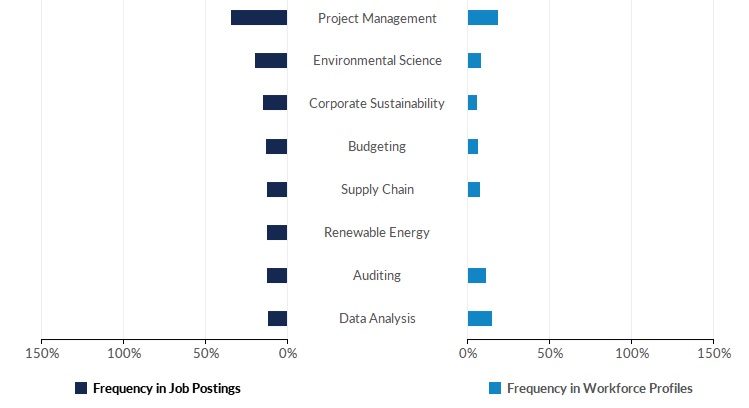
Meanwhile, in looking at professional skills, employers need abilities such as presentations, planning, innovation, and writing.
Top Professional Skills in Demand in Sustainability-titled Jobs, June 2019 – May 2021 (N=4,152; Source: Emsi)
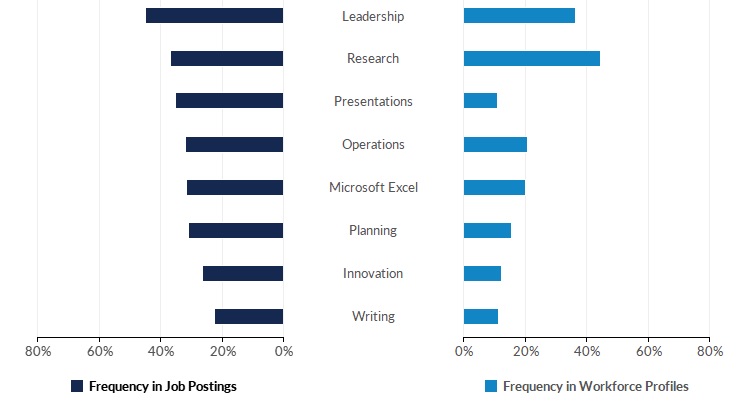
The specialized and professional skills listed above are covered in MBS courses such as Fundamentals of Sustainability, Sustainable Energy, Sustainable Environmental Biotechnology, Resource Sustainability, and Sustainability: Supply Chain Management/Green Purchasing. Dr. Kevin Lyons teaches several courses on sustainability in the MBS program, including Supply Chain Management/Green Purchasing. He recently predicted that up-and-coming skills include Life Cycle Assessment and supply chain traceability. “These are terms we may be seeing in the future, so stay tuned,” Lyons told us.
Types of Jobs: To get an idea of the types of jobs requiring such skills, we sampled a few job postings on both the Emsi and Burning Glass platforms:
- Sustainability Program Manager – help shape [company] policy and actions to reduce our carbon footprint / increase sustainability awareness; work with industry groups…to find opportunities presented by changing sustainability/ESG (Environmental, Social and Governance) standards.
- Environmental Sustainability Advisor – assist [company] in integrating environmental practices within their programming and operations and help them strengthen their environmental sustainability plans.
- Director, Sustainability Services – candidate needs to have a deep knowledge of the sustainability industry, regulatory requirements, and geographic specific needs/differences. Candidate must lead and build a deep understanding of customer & market requirements/trajectories (what do they need today, and where are they headed), to develop industry leading sustainability products that enable our customers to achieve their sustainability goals.
- Sustainability Manager: Provide leadership, guidance and programmatic support for cost effective carbon / environmental footprint reduction strategies and impacts across [the company’s] business; enhance data tracking and reporting capabilities, including overseeing annual CDP reporting.
The first example mentions Environmental, Social, Governance (ESG), and the final example mentions CDP (Carbon Disclosure Project) reporting, topics that came up during the November 2020 panel discussion along with positions specific to Greenhouse Gas emissions (GHG). We narrowed our Burning Glass search to include these terms. This yielded 5,211 unique job postings over the same two-year period as above, which is eighty percent of all sustainability-titled jobs tracked. The job titles were similar whether filtering for ESG, CDP, and GHG or not. One common title was Corporate Responsibility Manager, and as has become clear recently], “corporate social responsibility” programs are branching out beyond social responsibility into environmental responsibility with a focus on those ESG jobs.
Where are sustainability jobs located? During the past two years, California, New York, Illinois, and Texas have seen the lion’s share of job postings, accounting for over one-third of all sustainability jobs in the nation. However, when looking at Metropolitan Statistical Areas, the New York-New Jersey area is at the top of the list. It’s notable that the Washington, DC metro area has the second most number of job postings. While New York is almost always in the first spot, in other recent labor searches, cities such as Boston, San Francisco, and Chicago were second. That Washington takes that spot with sustainability-titled jobs tells us that jobs in or related to government may be becoming popular.
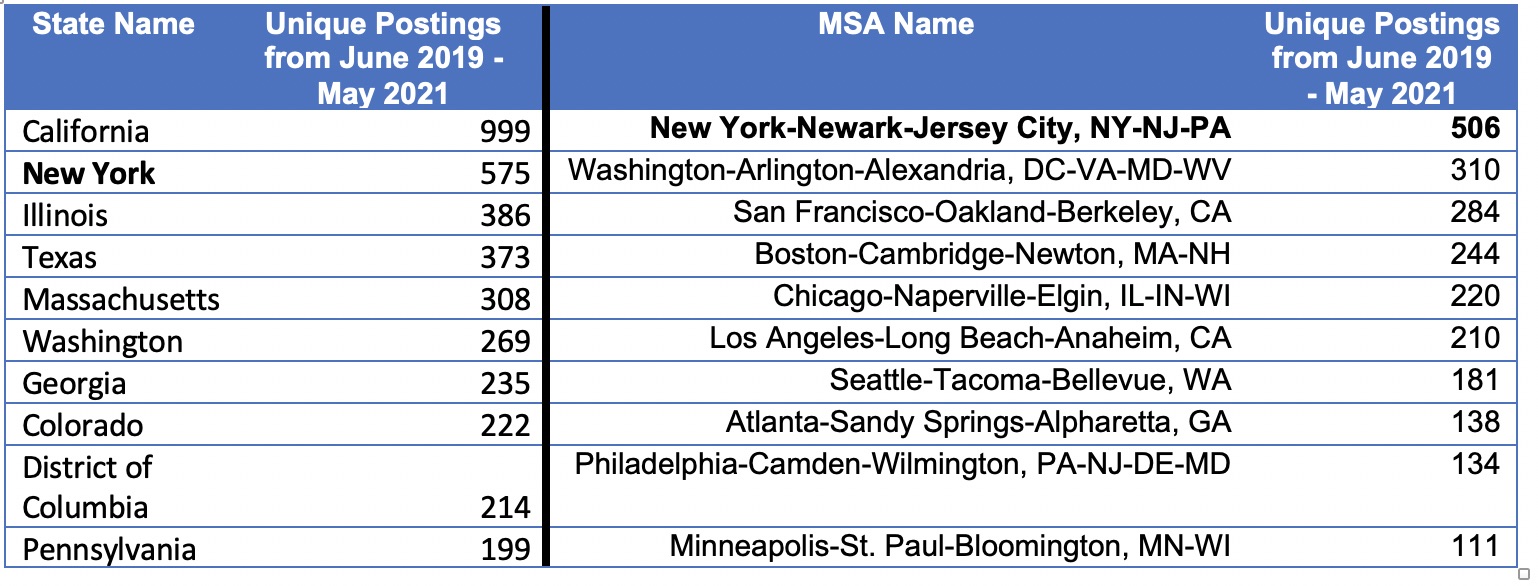
According to Burning Glass, the number of sustainability job postings is 1.9 times the national average in the New York metro area, 2.2 times the national average in the Washington, DC area, and 2.1 times the national average in the San Francisco Bay area. The only MSA in the U.S. where the number of sustainability jobs was lower than the national average was Dallas-Fort Worth-Arlington.
Sustainability is the future: As our panel discussed, businesses are now integrating sustainability into their overall operations—as well as into their bottom lines. Consumers, stakeholders, and shareholders have an increased interest in seeing these efforts continue and grow. Investors in Exxon Mobil recently elected two members to the company’s board who would press to “steer the company toward cleaner energy and away from oil and gas.” Such top-down changes will be met with grass-roots desires in consumer markets for companies to consider the environment, broadly, and sustainability, more specifically, in their future plans.
Methods: This blog analyzes data from June 1, 2019 through May 31, 2021 in Emsi’s Analyst tool as well as Burning Glass’ Labor Insight tool. By mining the detailed information stored in job postings, we can determine what employers are looking for when they fill related positions. The positions in this article were selected based on job advertisements requesting ”sustainability” in the title, or as a job responsibility or skill. We narrowed the results by excluding extraneous job titles such as “servers/food service” and focusing on Standard Occupational Classifications identified by O*NET Code Connector related to sustainability and the environment. Rutgers MBS courses including Fundamentals of Sustainability and Green Supply Chain will cover the topics/skills discussed in the article.